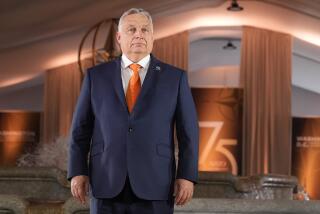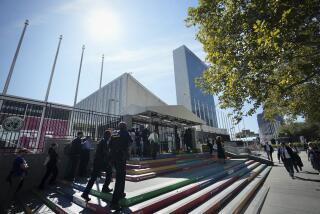Gorbachev Trip Aims to Build Momentum : ‘We’re Rolling,’ Soviet Aide Says as Leader Seeks Wider Global Political Role for Moscow
- Share via
MOSCOW — With the same relentlessness and energy with which he is pursuing reform in the Soviet Union, President Mikhail S. Gorbachev embarks Tuesday on his longest trip as the Soviet leader with the aim of assuring Moscow an even larger role in shaping world politics.
In a span of just nine days, Gorbachev will confer with President Reagan and President-elect George Bush in New York on arms control and international questions, deliver a major address to the U.N. General Assembly, reassure the Soviet Union’s Third World allies of its steadfastness with a trip to Cuba and meet with British Prime Minister Margaret Thatcher to round out a series of summits with West European leaders.
Major Soviet Concerns
Each stop reflects a major Soviet foreign policy concern, each meeting will focus on what Moscow regards as priority issues and the trip as a whole will add to the momentum that the Kremlin under Gorbachev has developed in international affairs.
“We’re rolling,” a Soviet foreign affairs specialist commented. “That is the best way to sum it up. . . . The movement at home with our political and economic reforms should be clear to all by now, but there is also movement, big movement, in foreign policy.”
Although part of a series of coordinated Soviet foreign policy initiatives, which stretch across Europe and reach out to Asia and to Africa, Gorbachev’s trip strongly reflects his personal penchant for action, for defining the issues in his terms and then forcing the pace of developments through repeated moves of his own.
“The Soviet leader will always be a major figure in world politics simply because the Soviet Union is such a colossus,” a West European ambassador who has dealt recently with Gorbachev said. “But in Gorbachev we have a different kind of leader, an extraordinary talent, an extraordinary personality, who seems to push and push and push. . . .
“And with his push, push, push, Gorbachev is increasingly shaping the agenda, that essential list of what most agree must be done, in international relations. We all are reacting to his ideas, his proposals. We all are waiting to meet with him, to negotiate with him, to strike a deal with him. And, remember, he has been an actor on the world stage for less than four years, and 10 years ago nobody had ever heard of him, even in Moscow.”
New Proposals Expected
New Soviet proposals--on arms control, on environmental protection, on resolution of regional conflicts, on strengthening the United Nations--are expected when Gorbachev speaks at the United Nations on Wednesday.
“The decision to address the General Assembly was prompted by our profound conviction that the United Nations organization is an indispensable mechanism in the search for peaceful solutions to world issues, for defusing conflict and crisis situations and settling other global problems,” Vladimir V. Petrovsky, a deputy Soviet foreign minister, said late last week.
Gorbachev, who will be the first Soviet head of state to address the body, had been looking for a broader forum to lay out his concept of “new political thinking”--an approach that challenges longstanding ideas in foreign policy by asking, “Why? Do we really benefit?”
Another measure that Gorbachev applies frequently in international affairs is that of the “common interests of mankind,” a concept that Soviet officials say has replaced Marxist “class struggle” in underpinning Soviet foreign policy.
This new outlook has brought many fundamental changes in the Kremlin’s approach to international issues, and Gorbachev has wanted to challenge other leaders to take a fresh look at their policies.
“Gorbachev is a visionary, and he wants to share that vision with everyone,” a sympathetic East European diplomat commented.
The U.N. speech, which has already gone through several drafts and is still being revised, will contain “not a few surprises,” a senior Soviet official remarked. “We are hopeful that this speech will set a lot of things in motion.”
Substantive Summit Issues
Other Soviet proposals, again on arms control and regional conflicts, will probably be put to Reagan and Bush when the American and Soviet leaders meet for lunch later Wednesday at Governors Island in New York Harbor.
Although U.S. officials initially played down the New York meeting as an informal get-together and not a full summit in the traditional sense, they said last week that they would be “very flexible” on the agenda as Soviet officials signaled their plans to raise substantive issues and press Bush for his views.
“The Soviet leadership intends to put on the agenda of the New York talks important, significant issues of real political interaction between the two countries on a broad range of issues,” Petrovsky said.
The Kremlin had feared a hiatus in Soviet-American relations because of the presidential election and the transition from one U.S. administration to another.
“We are against a pause while the United States goes through its transition,” a Foreign Ministry official commented. “We lose the momentum that we have spent nearly six years building up, we put at risk the mutual understanding and good working relationship that have developed and we jeopardize those agreements that are half-done, three-quarters-done and which can quickly be undone if someone decides on a new approach. . . .”
‘Invited Ourselves’
Soviet officials had been worrying about how to manage the transition from the Reagan to the Bush Administration when Bush, while campaigning a week before the election, said he would seek an early meeting with Gorbachev if elected.
“Well, we were even more interested in an early meeting, and early for us meant right away if possible, not next summer as it did for Bush,” the Foreign Ministry official said. “So, we decided that this might be a good time to make the speech that Gorbachev had been thinking about. . . . It is not unfair to say that we did invite ourselves for lunch.”
The Soviet move took the Reagan Administration, as well as Bush, by surprise--a characteristic Gorbachev tactic in foreign affairs as well as domestic politics. Moscow has since worked to turn what the White House first described as “a pleasant luncheon” into a serious discussion.
The basic Soviet hope, according to foreign affairs specialists here, is that Bush will commit himself to the same agenda, the same priorities, the same understandings that Reagan had with Gorbachev. The Soviet leader will also suggest, these sources said, that he and Bush agree on a broad outline for further dialogue after Bush takes office.
“We would like new commitments, of course,” another Foreign Ministry official said, “but, first of all, we want to confirm what we have.”
Fast Pace of Meetings
Gorbachev also added Cuba to the itinerary and brought forward a visit to Britain that had been planned for early 1989.
His meeting with Thatcher, the first Western leader to recognize his true stature, rounds out a series of summits he has held with President Francois Mitterrand of France, Chancellor Helmut Kohl of West Germany and Premier Ciriaco De Mita of Italy in the past two months.
Even compared with the headiest days of detente in the 1970s, when the late President Leonid I. Brezhnev was meeting Western leaders regularly, the pace is fast, almost forced, as Gorbachev pushes for acceptance of his idea of a “common European home” uniting East and West Europe and for a start on reducing armed forces in central Europe.
The visit to Britain, Petrovsky said, is “a new round in the political dialogue with the British leadership . . . a dialogue that goes beyond the scope of bilateral relations and is felt within a broad international context, including at the United Nations.”
“Europe is important for Gorbachev in ways that the United States is not,” a West European diplomat commented. “First, Russia is in Europe and America is across an ocean or two. Second, Europeans are easier to deal with as the issues are usually simpler, more straightforward, not global and (are) closer to immediate Soviet interests.
Political Courage Seen
“But it took some intellectual and political courage for Gorbachev to start thinking of the Soviet Union more as a European country, not a great superpower on par with the United States. It is a superpower, yes, but it is not on par. Yet, once that truth is acknowledged, there is great beauty in recognizing the multipolar world.”
However, the Soviet Union is also an Asian power, and is in the midst of very delicate negotiations with China, its giant socialist neighbor, to end their 30-year feud and with Japan, with which it has yet to conclude a peace treaty formally ending World War II.
Gorbachev met here last week with Qian Qichen, the first Chinese foreign minister to visit Moscow since 1957, and a Sino-Soviet summit is likely in April in Beijing.
Soviet Foreign Minister Eduard A. Shevardnadze is scheduled to travel to Tokyo later this month in an effort to raise Soviet-Japanese relations from the low plateau where they have remained for years because of a territorial dispute and deep political differences.
In going to Cuba on the first visit by a top Soviet leader in nearly 15 years, Gorbachev will be attempting to deal with what, rather surprisingly, has become the most difficult area of Soviet foreign relations, the developing countries of the Third World.
Retreat From Revolution
By cutting back on its economic and military assistance, focusing its resources and energies on its own development and tempering its support for radical regimes and groups and urging moderation instead, the Soviet Union appears to have retreated from the front line of the world revolution.
Gorbachev, on a visit to India last month, attempted to allay the widespread apprehensions that the Soviet Union is about to abandon its Third World allies, and his mission will probably be the same when he travels to Cuba next weekend for talks with President Fidel Castro.
More to Read
Sign up for Essential California
The most important California stories and recommendations in your inbox every morning.
You may occasionally receive promotional content from the Los Angeles Times.












